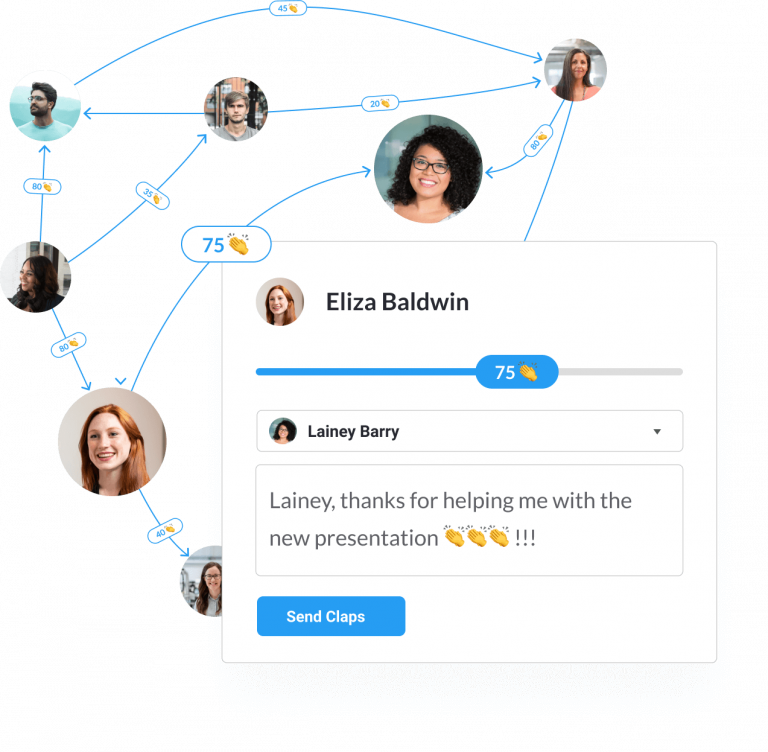Have you ever worked with people who are rockstars in their work, but when you try to acknowledge them, it is as if they don’t believe in their success? Or maybe you have heard an employee on a presentation, speaking so naturally and confidently that there is no doubt that they are an expert on what they are talking about. Nevertheless, when you try to give them positive feedback, instead of being grateful, they seem insecure and ask you thousands of questions about their performance. Indeed, these reactions might make you think they have low self-esteem. What may never cross your mind is that they might be experiencing imposter syndrome.
What is imposter syndrome and how does it affect your company
Imposter syndrome, known also as fraud syndrome, is a psychological experience in which successful people feel phony about themselves. Thoughts such as “I’m not good enough” usually cross their mind. People with imposter syndrome are not capable of accepting their own achievements and success.
One may think that imposter syndrome is related to low self-esteem or insecurities. Truth be told it has nothing to do with it. Researchers and psychologists relate it to being extremely perfectionist and hard on themselves.
It is very common to experience imposter syndrome at different stages of our life, especially in very competitive environments such as the workplace. According to Indeed’s Working on Wellbeing report, 58% of employees are experiencing imposter syndrome at work.
Employees who live with this mental health issue feel the need to work excessive hours to meet company expectations. This kind of behavior may lead to a very popular and harmful disease called: burnout, which affects employee motivation and performance. In the end, if it’s not identified on time, will probably end in resignation.
Imposter syndrome also affects employee productivity. These people may have achieved great results thanks to all their amazing skills, but unfortunately, they tend to extremely focus on every single detail. This type of perfectionism makes them waste valuable time on unnecessary tasks.
Rephrasing all these previous thoughts, imposter syndrome leads to
- Reduce employee productivity.
- Increase burnout.
- Eventually, to employee resignation.
This is why as part of the People and Culture team we must stay open-eyed and search for any symptoms the team may present.

How HR can identify the 5 types of imposter syndrome
We bet there is a question hovering in your mind: how to identify employees with imposter syndrome? We can answer that it won’t be an easy one, but for sure learning about the 5 types of imposter syndrome will help you open your eyes.
1. The perfectionist
As we mentioned before, perfectionism and imposter syndrome are directly related. People with this type of profile tend to set very ambitious goals. When they get to achieve them, instead of feeling proud, the thought that crosses their mind is “I could have done it better”. Judging themselves makes them feel as if they must work even harder to feel accomplished.
If you notice an employee is acting as a perfectionist, you could ask them these questions:
- What makes you think you could have done a better job?
- Why didn’t you ask your team for help developing this project?
- Do you feel the need to review more than twice every single detail of a job, before handing it in?
- Do you feel that your manager and the company have quality standards that are very hard to meet?
There are some good practices and strategies you can use to help these employees, but we’ll get deeper into that later on.
2. The expert
On their behalf, experts feel like complete liars. They think that at any time the company will discover they weren’t truthful about their skills for the job. They believe that their knowledge and experience aren’t good enough to meet the goals and expectations that the company has of them.
These are some questions you can ask experts:
- Do you feel your skills and knowledge aren’t good enough to succeed in your work?
- This way of thinking forces you into looking for classes to prove to you and the rest of the team that you really master a field?
- Does it bother you that someone seems to be better at something than you?
3. The superhero
Just like perfectionists, superheroes feel that they must work nonstop to end with self-distrust. Over time this will affect their mental health and make them feel isolated, leading to the first burnout symptoms.
If you cross with employees with this profile, ask them:
- Do you feel you must overwork to impress everyone on the team?
- Does it make you anxious and stressed when people on your team aren’t willing to work extra hours just like you?
- Do you think that breaks and rest days aren’t necessary?

4. The soloist
Just as the name suggests, soloists are employees with imposter syndrome who rather work on their own. They don’t like asking for help because of the fear that everyone will realize their weaknesses. This type of behavior, besides leading to overwork, affects their professional relationships. Strat avoiding co-workers and feeling as if they don’t belong to the team are the usual consequences of it.
To identify a soloist, ask them:
- Do you think that working solo will make you get better results?
- Are you ashamed of asking for help? Do you think that by doing so, they’ll think you are not good enough?
- Are you afraid that your managers and colleagues will discover your weaknesses?
5. The natural genius
Geniuses are employees with imposter syndrome who believe that everything must go perfectly as planned on the first try. For them, success is proportional to their skills and not to the effort invested in a job. Moreover, natural geniuses relate hard work with a lack of experience and skills.
When they face a situation in which they must invest a lot of time and effort, it makes them feel uncomfortable and unprepared, letting frustration take over control.
Some questions you can ask to identify geniuses are:
- Are you used to standing out from other people without much effort?
- Do you see challenges as barriers to moving on a project because you don’t know how to overcome them?
- When you don’t have the answer right away for a problem, do you think you will never find a solution?
Overcoming imposter syndrome with these 10 methods
After giving some hints on how to identify the possible imposter syndrome profile types, it’s time to talk about good practices for overcoming it. Be aware that even though these initiatives must come from human resources, managers must be on board with them. This is the only way for the team to make them part of their daily routine.
1. Set clear performance goals and follow up periodically
Be sure employees know what is expected of them and that they agree on the goals they have to reach.
We advise setting SMART goals along with every team member. Besides boosting employee productivity and motivation, it helps end imposter syndrome. By talking with employees about what is expected of them, there is no room for assumptions that leads them to overwork. Furthermore, as SMART goals are achievable and timely they know how much time they have to reach them.
Once these goals are set, you should also think about a follow-up plan. Try to find a way to be close and approachable to the team. Offer your help and additional resources to assist employees to improve their performance. You can do it through monthly 1:1 meetings.
2. Build a feedback culture
Creating a feedback culture is another good practice for overcoming imposter syndrome. Getting to deeply know your employees, let you be agile at identifying their needs or any problem they might be facing. Thanks to all the feedback you gather from the team, it will be easier for HR and management to recognize employees experiencing imposter syndrome.
When feedback is part of your company, it also eases employee interaction. They will be open to sharing ideas about the projects they are working on, realizing all the benefits that teamwork brings to the table. “Soloists imposters” won’t look at their weaknesses as a negative thing, but in the opposite direction, they will see how they complement themselves with their co-workers. A great way to get better results!
Feedback, when constructive, also helps overcome imposter syndrome, because it leads to continuous improvement. Employees will realize how advice can lead to boost the entire team’s performance.
3. Design an employee recognition plan
You can also end the imposter syndrome by implementing an employee recognition plan. What better way to build trust in the team than recognizing employees’ wins? Receiving frequent positive feedback helps imposters to realize and believe in their success.
Something you can do to turn employee recognition into a habit is gamifying the process. There are some human resources tools that help you do so and Nailted is one of those. You can create positive feedback loops between employees, in an easy and funny way! Every Friday each employee receives 100 claps to compliment their teammates for something great they have done recently. On Mondays, everyone receives those messages as a shot of energy to start the week on the right foot!

4. Foster open and honest internal communication
A key element for the previous three methods to be successful is to foster good internal communication.
- In order to properly follow up on an employee’s performance and goals, it’s a must for them and the manager to communicate constantly.
- Feedback only can become a habit if the company has the right communication channels to ease it.
- The same happens with employee recognition. If employees don’t have the right tools or spaces to give positive feedback, they’ll abstain from giving it.
This is why human resources teams need to set the right communication channels to end the imposter syndrome. It’s a way to get closer to the team, know their necessities and easily identify their strengths and weaknesses. This will help you design engagement strategies adapted to your employees.
We advise:
- Use tools such as Slack to foster open and fluid communication with every team member. Here is a list of the 12 best internal communication tools that can help you improve it.
- Send pulse and anonymous satisfaction surveys to the team. It will help you gather real-time data and insights from your people.
- Encourage managers to have 1:1 meetings with each team member. It is a way of building a stronger relationship. This will help managers identify employees experiencing imposter syndrome and make it easier for them to offer help.
5. Promote employee development
Promoting employee development will also help to overcome the imposter syndrome. Building a development plan with each employee, besides giving them direction, helps them to deeply analyze and understand the strengths, weaknesses, and long-term goals. Also, by setting KPIs and following up on this development plan, employees will see with their own eyes how much they grow and improve over time. Employees with imposter syndrome will finally be aware of their success!
In order to boost the development of each employee you must be aware that the same method doesn’t apply to everyone. If you don’t know how to start, here are 9 ways to boost employee development.
6. Encourage managers and reports to have 1:1 meetings
As previously mentioned, 1:1 meetings between managers and reports are great spaces to build a stronger and more trusting relationship.
It is recommended to foster these meetings at least once a month, where managers and employees previously share an agenda with all the talking points. As you can imagine, this ends up being a good opportunity for managers to ask questions that help them identify the imposter syndrome among employees:
- What makes you think you could have done a better job?
- Do you think that working solo will make you get better results?
- Do you feel you must overwork to impress everyone on the team?
7. Help employees to reach mental health in the workplace
Imposter syndrome is a psychological condition that affects employees’ mental health and may lead to workplace burnout. This is why it is so important to build a healthy and safe workspace. These are some good practices to do so:
- Promote a work-life balance.
- Offer employees attractive and useful benefits.
- Offer flexibility and promote smart working.
- Ease channels and tools for employees to give feedback to the company or express concerns about their job.
- Take into account the feedback employees give to improve company culture.
- Organize team-building activities.
If an employee is being deeply affected by imposter syndrome, it’s better to ask a psychologist for professional help. Giving them a few days off would also be necessary for them to get back at their peace.
8. Promote psychological safety
Psychological safety at the workplace is feeling safe to speak and express your opinion, without fear of being judged or reflecting a negative image in the company. Implementing different initiatives to promote it, help employees not be afraid of expressing their thoughts. That is why you need to take the time to measure the team’s psychological safety.
According to a study conducted by Google, data indicated that psychological safety, more than anything else, was critical to making a team thrive. It will encourage those employees experiencing imposter syndrome to speak up and share their feelings. They will fill part of a safe environment, realizing that asking for help shows a lot of strength!
9. Promote diversity, equity and inclusion in the workplace
Unfortunately, some employees may feel that their gender or race is a barrier to success, leading them to experience imposter syndrome.
In the People and Culture department, we play a major role in promoting diversity, equity and inclusion at all levels. It is not something that you only worry about while recruiting. At each stage of the employee lifecycle, you must make every employee feel that they matter to the company.
10. Use an Employee Engagement software
We know that starting with all these methods requires time and effort. We can also say that it is worth it! Besides identifying possible “imposters” on the team, you can find red flags and act promptly.
You can use an employee engagement software to automate processes such as:
- Gather feedback from employees and make better decisions with real-time data.
- Turn employee recognition into a habit in the workplace.
- Easily organize 1:1 meetings, performance reviews and check-ins.
- Design employee engagement strategies that fit your team’s needs.
Slowly your People & Culture team will become more efficient and agile. It will let them focus their efforts on designing strategies to improve company culture, and at the same time overcome imposter syndrome and burnout.










